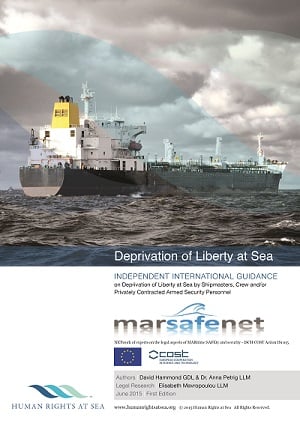Guidance on Deprivation of Liberty Released
Human Rights at Sea has published a new international and independent guidance for shipowners, crew and private maritime security guards titled: “Deprivation of Liberty at Sea.”
The guidance, published jointly by Human Rights at Sea (HRAS) and the Network of Experts on the Legal Aspects of Maritime Safety and Security (MARSAFENET) and financed through the European Union COST Action IS1105, is the first independently drafted international document covering deprivation of liberty (DoL) by ship masters, crew and private maritime security personnel. It is the result of in-depth research into the domestic and international legal frameworks governing deprivation of liberty on board private vessels.
The guidance, which complements existing guidelines on fair treatment of seafarers in the event of a maritime accident as adopted by the IMO, aims to become a leading soft law instrument voluntarily applied by relevant actors in the shipping, fishing and security industries.
 The guidance outlines a succinct set of principles and detailed guidance for safeguarding a criminal suspect’s human rights at sea. It additionally contains checklists for shipowners, masters, crew and private maritime security companies in relation to the lawful deprivation of liberty of suspected criminals at sea covering both the pre-transit planning and in-transit actions.
The guidance outlines a succinct set of principles and detailed guidance for safeguarding a criminal suspect’s human rights at sea. It additionally contains checklists for shipowners, masters, crew and private maritime security companies in relation to the lawful deprivation of liberty of suspected criminals at sea covering both the pre-transit planning and in-transit actions.
There is a growing likelihood that masters will have to deal with criminal offences committed at sea, with increasingly smaller crews and against a background of potential legal actions conducted against seafarers for unlawful deprivation of liberty, says David Hammond Founder of HRAS. The issue is highly relevant in piracy prone areas and areas with large migrant movements, like the Mediterranean and the Andaman Sea, where masters are likely to be confronted with suspected human traffickers.
The guidance is a reference for all interested parties in support of decisive and lawful decision-making, says Hammond. “This first edition of the Deprivation of Liberty at Sea Guidance has been the result of six months’ work involving significant research and stakeholder input. Working alongside European colleagues, Human Rights at Sea is proud to be able to deliver a new and relevant maritime human rights reference document in partnership with EU MARSAFENET.”
HRAS and MARSAFENET have determined that the voluntary guidance should be made freely available for the international public benefit in line with the charitable focus of HRAS and the open access policy pursued by MARSAFENET. Any entity using the document in whole, in part or in concept must fully attribute its use to HRAS and MARSAFENET. HRAS retains full IP and copyright over the work and the associated HRAS Deprivation of Liberty at Sea concept.
The authors of the Guidance are:
David Hammond, GDL
CEO & Founder of HRAS, Barrister & Member of MARSAFENET
Dr. Anna Petrig, LL.M.
Attorney-at-Law & Management Committee Member of MARSAFENET
Legal Research: Elizabeth Mavropoulou, LL.M. Attorney-at-Law & HRAS Intern

that matters most
Get the latest maritime news delivered to your inbox daily.
The guidance is part of the HRAS “Unlocking the issue” campaign to raise global awareness of maritime human rights and constitutes a milestone in MARSAFENET’s quest to transfer scientific findings into concrete normative and policy solutions.
The Deprivation of Liberty report is available to download from the Human Rights at Sea website under Publications here.
